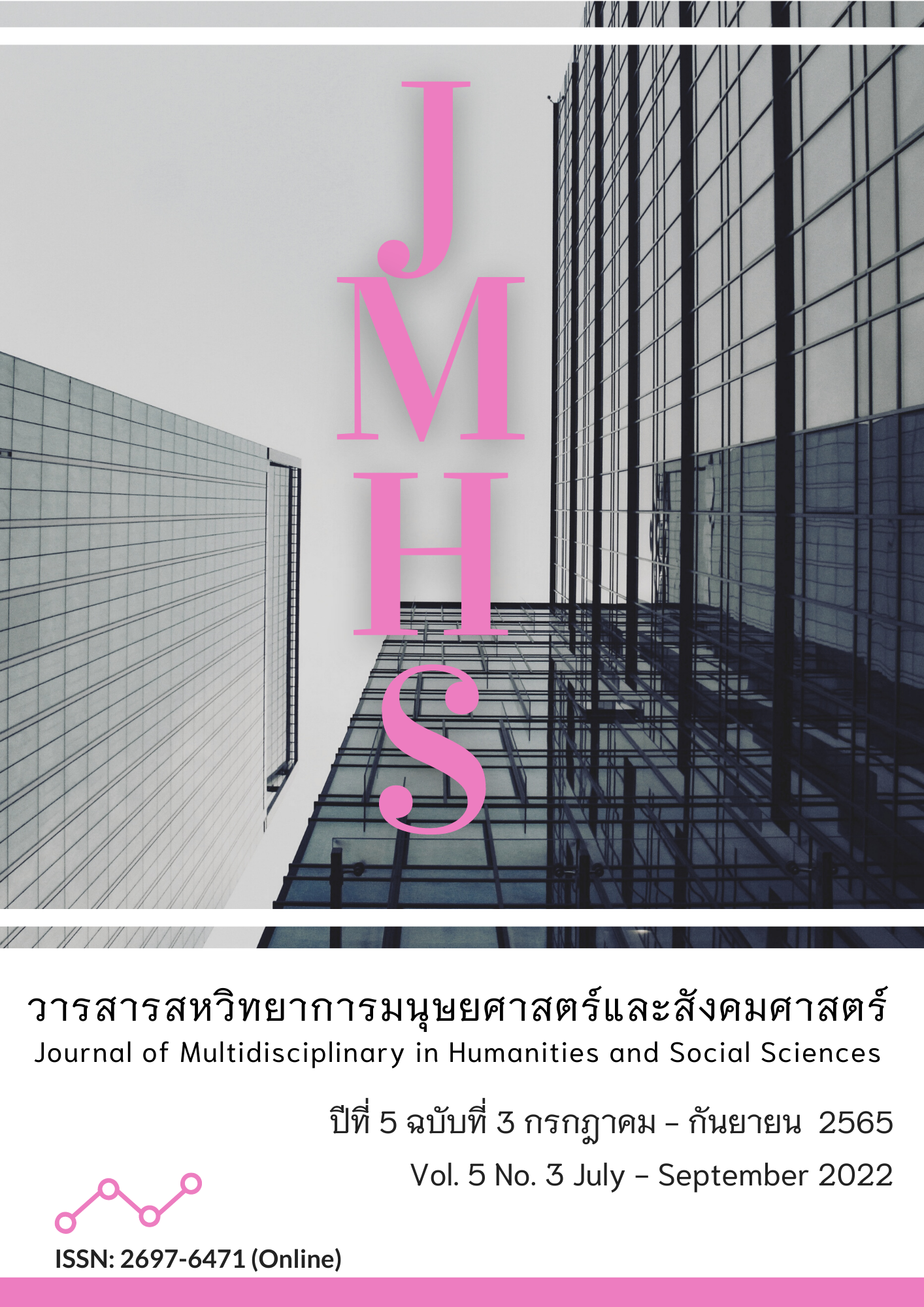Factors Affecting Customer Loyalty Towards Johnson and Johnson Company in Bangkok Metropolis
Main Article Content
Abstract
This article aimed to (1) study the level of customer participation, corporate image, corporate social responsibility, customer satisfaction, and customer loyalty; (2) study the influence of customer participation, corporate image, and corporate social responsibility on customer satisfaction towards products; and (3) study the influence of customer satisfaction on customer loyalty towards products. This study was conducted by Johnson and Johnson Company in Bangkok Metropolis. The research model was quantitative research. The research area was the Bangkok Metropolis. The sample consisted of 400 customers of Johnson and Johnson Company in Bangkok Metropolis by convenience sampling. The research tool was a questionnaire. analysis of data by frequency, percentage, mean, standard deviation, Pearson’s product-moment correlation, and regression analysis.
The research results were found as follows: (1) opinion of variables by customer participation at a low level, then opinion of variables by corporate image, corporate social responsibility, customer satisfaction, and customer loyalty at a high level; (2) customer participation, corporate image, corporate social responsibility positive influence customer satisfaction statistically significant at 0.05; and (3) customer satisfaction positive influence customer loyalty statistically significant at 0.05.
Article Details

This work is licensed under a Creative Commons Attribution-NonCommercial-NoDerivatives 4.0 International License.
Views and opinions appearing in the Journal it is the responsibility of the author of the article, and does not constitute the view and responsibility of the editorial team.
References
ฐาณพัฒฌ์ ภูแดนกลาง และ ชิณโสณ์ วิสิฐนิธิกิจา. (2564). คุณภาพการให้บริการที่ส่งผลต่อความพึงพอใจของผู้ใช้บริการขนส่ง บริษัท แฟลช เอ็กซ์เพรส จำกัด. วารสารศิลปการจัดการ, 5(1), 17-29. สืบค้นจาก https://so02.tci-thaijo.org/index.php/jam/article/view/245453
ธฤษิดา ไทยถาวร และ ศุภสิทธิ์ เลิศบัวสิน. (2562). องค์ประกอบของผลิตภัณฑ์และคุณค่าตราสินค้าที่มีผลต่อความภักดีในตราสินค้าของผลิตภัณฑ์บำรุงผิวหน้าในเขตพื้นที่จังหวัดชลบุรี. วารสารปัญญาภิวัฒน์, 11(1), 102-112. สืบค้นจาก https://so05.tci-thaijo.org/index.php/pimjournal/article/view/185945
ธีรนาฏ ขาวละออง และ สมบัติ ธำรงสินถาวร. (2564). ปัจจัยทางด้านการตลาดที่ส่งผลต่อความภักดีของผู้บริโภคต่อร้านอาหารเชิงท่องเที่ยวในจังหวัดชลบุรี: บทบาทของความชื่นชอบความหลากหลายของผู้บริโภค. วารสารรัชภาคย์, 15(42), 354-367. สืบค้นจาก https://so05.tci-thaijo.org/index.php/RJPJ/article/view/252451
ภูมิภัทร รัตนประภา. (2558). ความสัมพันธ์ระหว่างคุณค่าตราสินค้า ส่วนประสมทางการตลาด และความพึงพอใจของผู้ใช้บริการบัตรเครดิตของธนาคารพาณิชย์ไทยที่มีอิทธิพลต่อกลยุทธ์การสร้างความภักดีต่อตราสินค้า. วารสารปัญญาภิวัฒน์, 7(2), 43-56. https://so05.tci-thaijo.org/index.php/pimjournal/article/view/38481
รุ่งโรจน์ สงสระบุญ. (2564). โมเดลสมการโครงสร้างของปัจจัยที่มีอิทธิพลต่อความภักดีเชิงพฤติกรรมของนักศึกษามหาวิทยาลัยเอกชนในประเทศไทย. วารสารการวัดผลการศึกษา มหาวิทยาลัยมหาสารคาม, 27(1), 220-231. สืบค้นจาก https://so02.tci-thaijo.org/index.php/jemmsu/article/view/241178
ลัสดา ยาวิละ, อรนุช สืบบุญ และ รัตน์ชนก พราหมณ์ศิริ. (2563). การบริหารลูกค้าสัมพันธ์ ความจงรักภักดีของผู้ประกอบการธุรกิจ พาณิชย์อิเล็กทรอนิกส์ ในเขตอำเภอเมือง จังหวัดพิษณุโลก. วารสารวิทยาการจัดการ มหาวิทยาลัยราชภัฏพิบูลสงคราม, 2(3), 27-39. สืบค้นจาก https://so03.tci-thaijo.org/index.php/jmspsru/article/view/252809
Barnard, C. (1938). The Functions of the executive. Massachusetts : Havard University.
Carroll, A.B. (1991). The Pyramid of Corporate Social Responsibility: Toward the Moral. Management of Organizational Stakeholders, Business Horizons, 54(4), 39-46.
Dabholkar, P. A. (2015). How to Improve Perceived Service Quality by Increasing Customer Participation. In: Dunlap, B. (eds) Proceedings of the 1990 Academy of Marketing Science (AMS) Annual Conference. Developments in Marketing Science: Proceedings of the Academy of Marketing Science. Springer. https://doi.org/10.1007/978-3-319-13254-9_97
Kotler, P. (1997). Principles of Marketing. New Jersey: Prentice-Hall.
Kotler, P. & Keller, K. (2009). Marketing management. (13th ed.). New York: Prentice-Hall
Reichheld, F. F., & Schefter, P. (2000). E-Loyalty: Your Secret Weapon on the Web. Harvard Business Review, 78(4), 105-113.
Sharma, K., Ow-jariyapithak, D., Dasri, P., Van Brecht, D., & Sahakijpicharn, D. (2021). Impact of Corporate Governance on Firm Efficiency: A Study of Thai Banking Companies. International Journal of Multidisciplinary in Management and Tourism, 5(2), 66-86. https://doi.org/10.14456/ijmmt.2021.8
Szczepanka, K., & Gawron, P. P. (2011). Changes In Approach To Customer Loyalty. Contemporary Economics, 5(1), 60-69.
Tan C.C., Damnoen P.S., Toprayoon Y., Dabjan N., Damkam K. (2022). An Exploratory Study of the Spirituality-Oriented Experiences of Tourists. In: Srivastava P., Thakur S.S., Oros G.I., AlJarrah A.A., Laohakosol V. (eds) Mathematical, Computational Intelligence and Engineering Approaches for Tourism, Agriculture and Healthcare. Lecture Notes in Networks and Systems, 214, 307-314. https://doi.org/10.1007/978-981-16-3807-7_25


